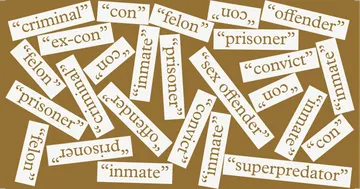Reporters and editors have long believed that terms such as “inmate,” “felon” and “offender” are clear, succinct and neutral. But a vocal segment of people affected by the criminal justice system argue that these words — and any other words that define human beings by their crimes and punishments — are dehumanizing.
The Marshall Project occupies a unique space in criminal justice reporting. We are not an advocacy organization, but we are committed to sustaining a sense of national urgency about the U.S. criminal justice system. As a result, fellow journalists often ask us about our style and standards around the language of criminal justice, and activists we meet frequently confront us about our usage of words such as “inmate.”
The Marshall Project began addressing this issue in 2015, our second year of existence, but we did not make a decision to change our style guide. Since then, through our deepening engagement with formerly and currently incarcerated people, we have realized the urgency of examining and articulating the language we use.
The Language Project serves three purposes. First, through a series of powerful pieces by and about people with intimate experience with incarceration, we show the human impact of the words we choose. Second, our guide, “What Words We Use — and Avoid — When Covering People and Incarceration,” makes public our decision to avoid labels such as “inmate,” in favor of language that follows the logic of “person-first” language. Third, we provide alternatives to the labels.
At its heart, journalism is a discipline of clarity. The Language Project is our attempt to set the record straight.
I didn’t always detest this term. But hearing officers use it as an insult reminded me to call incarcerated people — including myself — by our names.
Of course not everyone means harm when they use prison labels. But that doesn’t make the language any less damaging.
As correctional officers, we are conditioned to call prisoners ‘inmates.’ But at Sing Sing, where I worked for 25 years, that was as bad as calling them a snitch.
While we have to be aware that any word we choose has influence, no amount of Googling will reveal the magic word that brings justice into American prisons.
Rahsaan Thomas, an imprisoned journalist, has long fought to change the way outside media describe people in prison. One of his toughest crowds? His fellow reporters.
Journalism is a discipline of clarity. That’s why we’ve solidified our policy about how we talk about people who are currently in or have previously been in prison and jail.
Credits
Written by Lawrence Bartley, Lisette Bamenga, Adria Watson, Rahsaan Thomas and Wilbert L. Cooper
Edited by Akiba Solomon
Design and development by Bo-Won Keum and Katie Park
